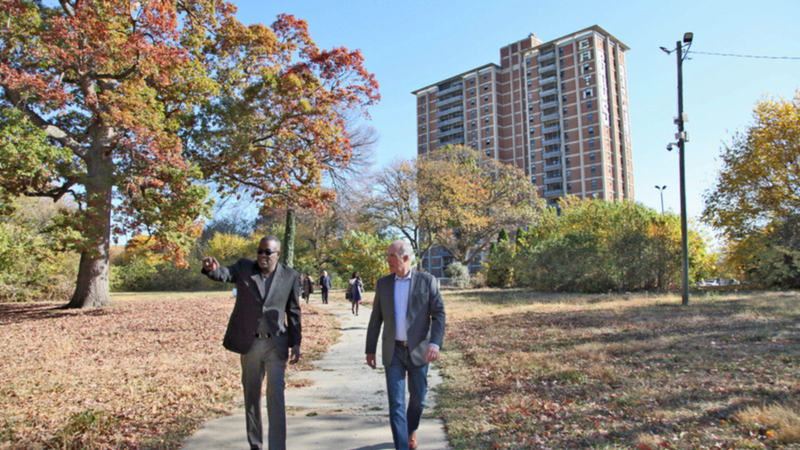
PHILADELPHIA (KYW Newsradio) — The Philadelphia Housing Authority unveiled an eight-year, $6.8 billion plan Monday to renovate its 13,000 rental units and acquire 7,000 new ones.
“The project that we are undertaking, we are calling the ‘Opening Doors’ initiative, which is to preserve and expand the supply of affordable housing across the city,” said PHA President and CEO Kelvin Jeremiah.
The project was quietly launched more than a year ago, he said, when PHA began acquiring property from private developers. He said PHA intends to acquire 4,000 units that way, but he added, “We are not interested in buying everything and anything.”
“We are making strategic investments in properties that have already been renovated that are A-class, maybe A-, and we are strategically looking at communities that have been inaccessible (to public housing tenants),” Jeremiah said. “We’re not looking for the type of units that are conventional public housing. If your property hasn’t had any influx of capital in the last 20-25 years, thank you, we’ll pass.”
Jeremiah said buying the property is the cheapest way to expand PHA’s inventory, but the project also envisions building 3,000 units from the ground up, which, estimated, would cost $550,000 per unit — about twice the cost of existing units.
In addition, PHA plans to preserve existing units, more than 60% of which are over 70 years old. Opening Doors calls for renovating most of them but demolishing and rebuilding nearly 4,000 units, which he said are functionally obsolete.
The budget includes $3.8 billion for existing units, $1.6 billion for building new units and $900 million for buying new units.
Funding would come from multiple sources, including tax credits, grants and a recently approved $450 million bond sale.
The project would restore PHA’s inventory nearly to the so-called Faircloth Limit, a federal cap which allows PHA to own up to 21,000 units.
Past renovation efforts — prior to Jeremiah’s arrival 12 years ago — resulted in a loss of 7,000 units as PHA replaced high rises with lower-density buildings. Jeremiah said that must be reversed in the face of Philadelphia’s “overwhelming” affordable housing crisis.
He conceded that tariffs might impact the budget by increasing the cost of lumber and other materials, and that there would be intense competition for them because of rebuilding efforts after Southern California’s devastating wildfires.
But he did not think Trump administration cuts would have a significant impact, arguing that PHA reflects the goals of operating efficiently and getting residents on the path of social and economic mobility.
“If we have to make some mid-course corrections to the plan, I am prepared to do so, but I fully intend to work constructively with the administration to get things done,” he said.
Another aspect of Opening Doors is converting all units to Section 8 payments, which he said provides more stable funding, allows PHA to leverage debt to support construction costs, ensures long-term affordability for current and future residents and protects tenants’ rights.
Jeremiah said he hopes the state and city will also begin subsidizing PHA, which gets 93% of its budget from the federal government. He noted that Opening Doors is working in tandem with Mayor Cherelle Parker’s HOME project, which seeks to build 30,000 units, so Opening Doors gets her ⅔ of the way there.
Councilmember Jaime Gauthier supports city funding for PHA and says she’s excited about Opening Doors.
“I’ve been helping them to purchase units in my district so they can remain affordable forever. So I couldn’t be more excited that PHA is doing this in a really big way with thousands of units,” Gauthier said.
